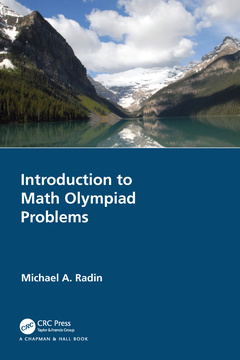Introduction to Math Olympiad Problems
Auteur : Radin Michael A.

Introduction to Math Olympiad Problems aims to introduce high school students to all the necessary topics that frequently emerge in international Math Olympiad competitions. In addition to introducing the topics, the book will also provide several repetitive-type guided problems to help develop vital techniques in solving problems correctly and efficiently. The techniques employed in the book will help prepare students for the topics they will typically face in an Olympiad-style event, but also for future college mathematics courses in Discrete Mathematics, Graph Theory, Differential Equations, Number Theory and Abstract Algebra.
Features:
- Numerous problems designed to embed good practice in readers, and build underlying reasoning, analysis and problem-solving skills
- Suitable for advanced high school students preparing for Math Olympiad competitions
1. Introduction. 1.1. Patterns and Sequences. 1.2. Integers. 1.3. Geometry. 1.4. Venn Diagrams. 1.5. Factorial and Pascal's Triangle. 1.6. Graph Theory. 1.7. Piecewise Sequences. 1.8. Chapter 1 Exercises. 2. Sequences and Summations. 2.1. Linear and Quadratic Sequences. 2.2 Geometric Sequences. 2.3. Factorial and Factorial-Type Sequences. 2.4. Alternating and Piecewise Sequences. 2.5. Formulating Recursive Sequences. 2.6. Solving Recursive Sequences. 2.7. Summations. 2.8. Chapter 2 Exercises. 3. Proofs. 3.1. Algebraic Proofs. 3.2. Proof By Inductions. 3.3. Chapter 3 Exercises. 4 Integers' Characteristics. 4.1. Consecutive Integers. 4.2. Prime Factorization and Divisors. 4.3. Perfect Squares. 4.4. Integers' Ending Digits. 4.5. Chapter 4 Exercises. 5. Pascal's Triangle Identities. 5.1 Horizontally-Oriented Identities. 5.2 Diagonally-Oriented Identities. 5.3. Binomial Expansion. 5.4. Chapter 5 Exercises. 6. Geometry. 6.1. Triangular Geometry. 6.2 Area and Perimeter Geometry. 6.3. Geometry and Proportions. 6.4. Chapter 6 Exercises. 7. Graph Theory. 7.1. Degrees of Vertices and Cycles. 7.2 Regular Graphs. 7.3. Semi-Regular Graphs. 7.4 Hamiltonian Cycles. 7.5. Chapter 7 Exercises. 8. Answers to Chapter Exercises. 9. Appendices. 10. Index. 11. Bibliography.
Michael A. Radin earned his Ph.D. at the University of Rhode Island in 2001 and is currently an associate professor of mathematics at the Rochester Institute of Technology and an international scholar at Riga Technical University Department of Engineering Economics and Management. Michael began his pedagogical journey at the University of Rhode Island in 1995 and taught SAT preparatory courses in addition to teaching his regular courses at the Rochester Institute of Technology. For the first time in 2019, Michael taught a mini-course for high school students on "Introduction to Recognition and Deciphering of Patterns" hosted by the Rezekne Technical University High School.
While teaching the SAT preparatory courses for the high school students, Michael established new techniques on solving multi−tasking problems that remit principles of geometry, integers, factoring and other crucial tools. He especially emphasizes when and how to apply these pertinent principles to his students by providing them numerous repetitive-type guided examples and hands-on practice problems. Michael applied similar strategies while teaching his mini−course for high school students on "Introduction to Recognition and Deciphering of Patterns" by directing the students’ focus on recognizing when and how to apply specific patterns after working out several repetitive−type examples that guide to formulation of theorems.
Recently Michael recently published four papers on international pedagogy and has been invited as a keynote speaker at several international and interdisciplinary conferences. Michael taught courses and conducted seminars on these related topics during his spring 2009 sabbatical at the Aegean University in Greece and during his spring 2016 sabbatical at Riga Technical University in Latvia. Michael’s aims are to inspire students to learn.
Furthermore, Michael had the opportunity to implement the hands-on teaching and learning style in the co
Date de parution : 07-2021
15.6x23.4 cm
Date de parution : 07-2021
15.6x23.4 cm
Thèmes d’Introduction to Math Olympiad Problems :
Mots-clés :
Hamiltonian Cycles; Bi-Partite Graph; Associate Graph; Consecutive Positive Integers; Consecutive Odd Integers; Pascal's Triangle; Hasse Diagram; Recursive Sequences; Hamiltonian Graphs; Triangular Geometry; Odd Integers; Consecutive Integers; Pascal's Identity; Sigma Notation; Perfect Squares; Blue Square; Cycle Graph; Geometric Sequence; Binomial Coefficient; Isosceles Triangle; Regular Graphs; Proper Divisors; Equilateral Triangle; Lattice Graph; Supplementary Angles



